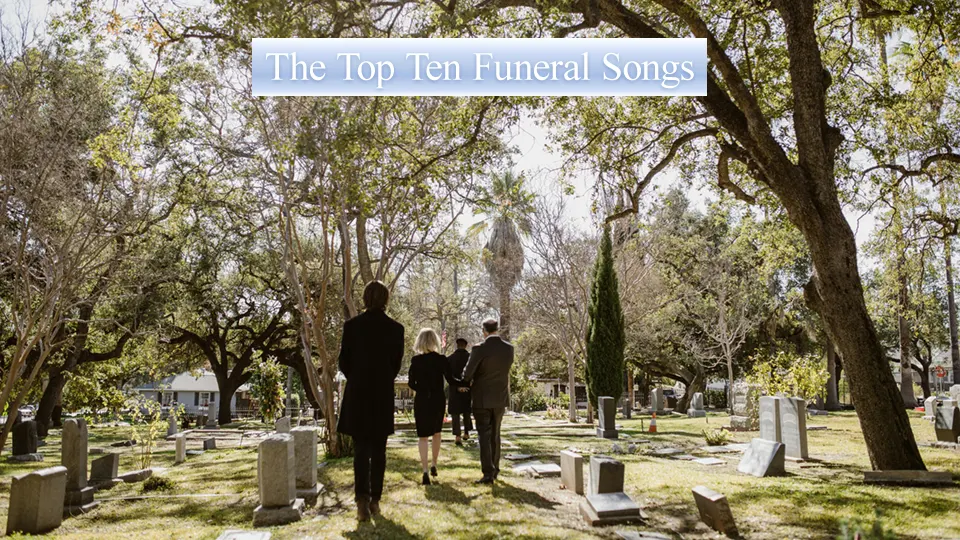Are you wondering what the top ten funeral songs are? What some people would say is the best music for funerals.
Unless already chosen by the deceased, choosing a funeral song to have played at a loved ones or friends funeral can be a tall order to fill. The list below shows popular funeral songs from the both ancient and modern times. Spanning some 1900 years from “Ave Maria” which dates back to AD 90 , while “Angels” performed by Robbie Williams was written in 1997. The top ten funeral songs can provide ideas of a suitable song, but likewise a funeral song should be personal to the deceased.
Key takeaways
- Funeral songs can be bold and powerful or gentle and quiet.
- Some of the most popular songs date back a very long time and have obviously stood the test of time.
- Funeral songs mean different things to different people, there is no set criteria.
Table of contents
1. My Way – Frank Sinatra
This song is top of the pops for the top ten funeral songs. “My Way” was adapted into English by Paul Anka in 1968. Anka based it on the French song “Comme d’habitude” (“As Usual”), composed in 1967 by Jacques Revaux, with original lyrics by Claude François and Gilles Thibaut. Paul Anka acquired the adaptation rights and rewrote the lyrics to suit Frank Sinatra, who recorded the song in 1969.
While the melody remained, Anka’s English lyrics cleverly shifted the theme from a fading relationship, to a reflection on a life lived on one’s own terms.
The song became one of Sinatra’s signature pieces and has been covered by numerous artists worldwide, including the Sex Pistols and Elvis Presley. Despite this being featured first on the top ten funeral songs and it being a signature song of Sinatra, he didn’t like the song! His youngest daughter Tina was interviewed in 2000 on the BBC show Hardtalk and said her father found it self indulgent.
2. Abide with Me
The hymn “Abide with Me” was written by Henry Francis Lyte in 1847. Lyte was a Scottish Anglican clergyman and poet.
Lyte wrote the lyrics shortly before his death from tuberculosis. The music most commonly associated with the hymn today was composed later by William Henry Monk in 1861, and that tune is called “Eventide”.
It’s a well-loved hymn, often sung at remembrance services and funerals due to its themes of comfort and divine presence in times of hardship.
3. You’ll Never Walk Alone – Gerry and the Pacemakers
“You’ll Never Walk Alone” was written by Oscar Hammerstein II who wrote the lyrics and Richard Rodgers who wrote the music in 1945.
It was originally composed for their musical “Carousel”, where it is sung to comfort the character Julie Jordan after her husband Billy Bigelow’s death.
Over time, this song, which is third on the top ten funeral songs, became hugely popular outside of musical theatre. Gerry and the Pacemakers released a hit version in 1963, which became the anthem of Liverpool Football Club and several other football clubs around the world.
It has also been performed by many other artists and is often sung as a symbol of solidarity and hope.
4. Time to Say Goodbye – Andrea Bocelli
The song “Time to Say Goodbye” was written lyrically by Lucio Quarantotto and music by Francesco Sartori in 1995. It was written in Italian as “Con te partirò”, which means “With You I Shall Leave.”
It was first performed by Andrea Bocelli in 1995.
The English version “Time to Say Goodbye” became famous in a duet by Andrea Bocelli and Sarah Brightman in 1996. This version which mixed English and Italian lyrics was a massive international hit, especially in Europe.
5. Amazing Grace
“Amazing Grace” which ranks fifth on the top ten funeral songs was written by John Newton in 1772. Newton was an English poet and Anglican clergyman who had previously been involved in the Atlantic slave trade. After a dramatic spiritual conversion during a storm at sea, he eventually became a passionate abolitionist. He wrote “Amazing Grace” as part of a New Year’s Day sermon in 1773.
The lyrics reflect his personal experience of redemption and forgiveness.
The melody most commonly associated with the hymn today (called “New Britain”) was added later, in 1835, in the USA.
6. Angels – Robbie Williams
“Angels” was written by Robbie Williams and Guy Chambers, it is one of the most melodic top ten modern funeral songs. It was released in 1997 as part of Robbie Williams’ debut solo album “Life thru a Lens”. “Angels” became his breakthrough hit and remains one of, and to many his most iconic song.
There’s also some songwriting credit controversy: an Irish songwriter named Ray Heffernan wrote an earlier version of a song called “Angels” and sold the rights to Robbie for a nominal fee before the final version was developed with Chambers. However, the widely released version that became famous is officially credited to Williams and Chambers.
7. We’ll Meet Again – Vera Lynn
“We’ll Meet Again” was lyrically written in 1939 by Hughie Charles and musically by Ross Parker.
At number seven on the top ten funeral songs, it became iconic due to Vera Lynn whose recording turned it into one of the most famous British songs of World War II. It brought comfort to soldiers and their families, offering hope that they’d be reunited after the war. For this reason alone it remains as one the most popular WW2 songs.
The song saw a revival in various films, shows, and public events and even featured in the finale of the 1964 film Dr. Strangelove. It also saw a revival during the COVID pandemic in the UK as a song of reassurance.
8. All Things Bright and Beautiful
“All Things Bright and Beautiful” was written by Cecil Frances Alexander in 1848.
She was an Irish hymn writer and poet, and this hymn was part of her collection “Hymns for Little Children”. The lyrics reflect her Christian beliefs and celebrate the beauty of God’s creation.
As for the melody several tunes have been used, but the most popular one is called “Royal Oak”, a 17th-century English melody arranged by Martin Shaw in the early 20th century.
9. Ave Maria
At number nine in the top ten funeral songs “Ave Maria” started out as a prayer dating way back to the Gospel of Luke AD 80-90. It refers to several musical settings of the traditional Latin prayer “Hail Mary”. Multiple composers have famously set it to music, however this prayer has been re-written over time. Here in brief is how it came together:
Biblical parts: 1st century (Gospel of Luke in the new Testament)
Combined into a prayer: by the 6th – 11th century
Final version: by the 13th – 16th century
It became standardised in the Catholic Church by the 16th century, especially after the Council of Trent (1545–1563).
Perhaps the most widely known and performed version is by Franz Schubert as “Ave Maria” in 1825. “Ave Maria” has been played at the funeral of different celebrities including Frank Sinatra, and John F Kennedy.
10. Somewhere Over the Rainbow – Judy Garland
Coming in at number ten of the top ten funeral songs “Somewhere Over the Rainbow” was written in 1938 by E.Y Yip Harburg, with music by Harold Arlen:
It was composed for the iconic film “The Wizard of Oz”, and famously sung by Judy Garland as Dorothy. The “Wizard of Oz” was made in 1939
The song won the Academy Award for Best Original Song in 1940 and has since become one of the most beloved and enduring songs in American music history. It still ranks on film critics lists as one of the best films of all time.
Top ten funeral songs & Best funeral song ideas
The top ten songs played at a funeral is provided by the SunLife cost of dying report 2025 (page 47).
Apart from the top ten funeral songs listed you can get more ideas on popular funeral songs by visiting the Funeral Song Generator.
Conclusion
Funeral songs can and often are a very personal decision. Whether old or new, as seen in the top ten funeral songs, funeral music holds a unique and powerful place in saying goodbye, offering comfort, reflection, and a sense of shared emotion. These top ten funeral songs of 2025 blend timeless classics with heartfelt modern ballads, each chosen for the meaning they carry and the memories they evoke.



